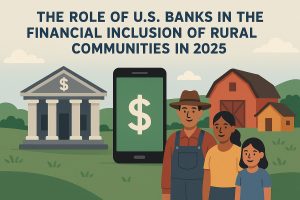Financial education plays a pivotal role in empowering individuals to make informed decisions about their money. In today’s digitally driven world, choosing the right digital account in the United States is a critical aspect of managing one’s finances effectively.
This article explores the significance of financial education and offers insights into selecting the best digital account in the U.S. Understanding the importance of financial literacy is the first step toward achieving financial well-being.
The significance of financial education in choosing the best digital account in the U.S.

Financial literacy is the bedrock upon which sound financial decisions are built, empowering individuals to navigate the complexities of modern financial systems with confidence.
It involves acquiring the knowledge and skills necessary to make informed choices about budgeting, saving, investing, and selecting financial products. By understanding fundamental principles, people can effectively manage their money, avoid financial pitfalls, and work toward long-term financial security.
In the context of digital accounts in the U.S., financial literacy plays a crucial role. A financially literate individual can analyze the features, fees, and benefits of various digital account options, ensuring they select one that aligns with their specific needs and financial goals.
This skill is particularly vital in today’s digital-first economy, where understanding online banking tools, interest rates, and hidden charges can make a significant difference in maximizing savings and minimizing unnecessary expenses, fostering overall financial well-being.
Empowering individuals in the digital age
As the financial landscape continues to embrace digital transformation, the ability to effectively navigate digital accounts has become increasingly important. Digital banking platforms offer convenience, flexibility, and a wide array of tools, but leveraging these benefits requires financial education.
Financial literacy empowers individuals to make the most of these platforms. From understanding critical online security measures to protecting personal data, to utilizing advanced digital tools for budgeting, saving, and investing, a financially educated individual is better equipped to take control of their finances.
By mastering digital banking, individuals enhance their financial flexibility and control, ensuring they stay ahead in a rapidly evolving financial ecosystem.
Choosing the best digital account
Selecting the right digital account is a crucial step in managing personal finances effectively. It requires a thorough evaluation of individual financial needs, preferences, and goals. Financial education plays a vital role in equipping individuals with the knowledge and tools to make informed decisions.
Key aspects to consider include account fees, which can impact long-term savings, and interest rates that may enhance account value. Additionally, mobile banking capabilities ensure convenience, enabling users to manage finances on the go.
Customer support quality is another critical factor, as it ensures assistance when issues arise. A well-chosen account supports both financial stability and growth.
Moreover, understanding the differences between traditional banks and online-only institutions enables individuals to make a choice that aligns with their lifestyle and financial objectives.
- Digital banking features and accessibility: Exploring the features offered by different digital banking platforms is essential. From mobile check deposit to real-time transaction tracking, understanding the functionalities enhances the overall banking experience. Financial education guides individuals in identifying the features that matter most to them, ensuring the chosen digital account meets their specific requirements.
- Security measures in digital banking: Security is a paramount concern in the digital realm. Financial education equips individuals with knowledge about encryption, multi-factor authentication, and other security measures employed by digital banks. This awareness is crucial for safeguarding personal and financial information in an increasingly interconnected digital environment.
- Budgeting and saving tools: Many digital accounts come with integrated tools for budgeting and saving. Financial education enables individuals to make the most of these features, facilitating effective money management. Understanding how to leverage budgeting apps, set savings goals, and automate transfers contributes to building a robust financial foundation.
- Comparing account fees and charges: Financial education enables individuals to dissect the fee structures associated with different digital accounts. This includes monthly maintenance fees, transaction charges, and ATM fees. Understanding these costs ensures that users can choose an account that aligns with their financial habits and minimizes unnecessary expenses.
- Building a credit history with digital accounts: Exploring how digital accounts contribute to building a credit history is crucial. Financial education sheds light on how responsible use of digital banking tools, such as credit cards linked to digital accounts, can positively impact credit scores. This knowledge empowers individuals to make strategic decisions that benefit their long-term financial health.
- Exploring account flexibility and customization: Financial education guides users in understanding the flexibility and customization options offered by digital accounts. This includes overdraft policies, account linking capabilities, and personalized alerts. Knowing how to tailor these features to individual preferences ensures that the chosen digital account seamlessly integrates into the user’s financial lifestyle.
Conclusion
In conclusion, the importance of financial education cannot be overstated, particularly in the context of choosing the best digital account in the U.S. Financial literacy empowers individuals to navigate the complexities of digital banking, make informed choices, and harness the full potential of modern financial tools.
As the financial landscape continues to evolve, investing in financial education becomes a strategic move towards achieving financial well-being in the digital age. In addition, financial education emphasizes the importance of regularly monitoring account activity to detect any unauthorized transactions promptly.
Understanding the security features of digital accounts is essential for safeguarding personal and financial information in today’s increasingly interconnected and technology-driven world.
As digital accounts become a central part of managing finances, communicating, and accessing services, the risks of cyber threats, including hacking, phishing, and data breaches, have grown significantly.
By familiarizing yourself with key security measures—such as two-factor authentication, strong password creation, encryption protocols, and activity monitoring—you can better protect sensitive data and reduce vulnerabilities.
Proactively understanding and implementing these features not only shields your personal information but also helps build confidence in navigating the digital landscape securely.
Features such as two-factor authentication, biometric login options, and encrypted transactions play a vital role in protecting accounts from unauthorized access and potential cyber threats.
Staying informed about these features enables users to confidently navigate online banking platforms while minimizing risks.
Additionally, awareness of fraud detection systems and secure communication channels with customer support enhances overall account safety. By prioritizing security and staying educated, users can enjoy a secure, seamless, and informed financial experience in the ever-evolving world of digital banking.






